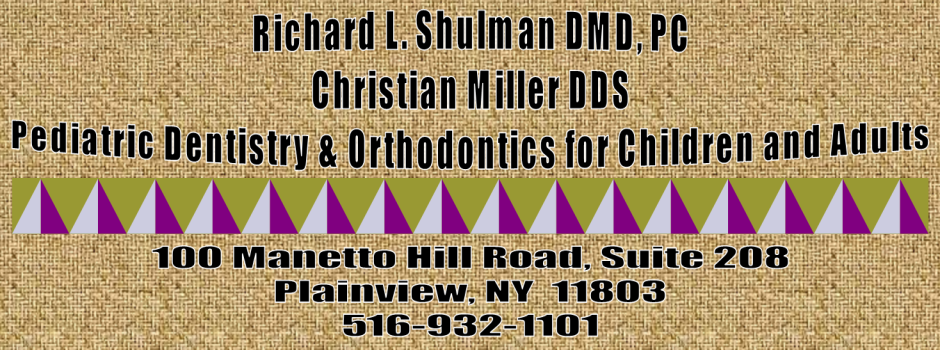Dr.’s Blog
December 7, 2015
5 Things every Long Island Parent needs to know about their kid’s teeth
There is no fluoride in the water anywhere in Long Island.
Every child needs to take a daily prescription vitamin with fluoride from infancy through fourteen years old. Do not stop at 6! The prescription is usually given by the child’s pediatrician, although the child’s dentist can also take care of prescribing. The dose changes at age two, age three, and then again at age 6. This type of fluoride is not the same as the fluoride in toothpaste, which is topical. Systemic fluoride found in prescription vitamins gets into the bloodstream and is deposited in your child’s developing teeth, making them stronger when they finally emerge.
Baby teeth do not all fall out until 12 years old, or sometimes even older.
While the front teeth fall out at around six years old, the primary molars stay until much later. They act as space holders for the adult teeth, so before you decide on your own not to fix decay in the baby teeth, discuss your opinion with your child’s dentist. There are many times baby teeth can be left alone, but in other circumstances it is very important to maintain them.
If I don’t treat my child’s baby tooth the cavity will spread to the new tooth underneath it.
A good half of the referred parents to my practice either think this on their own, or have been told this will happen
The baby teeth and adult teeth have different nerves, and different structure. There is NO WAY that a cavity on a baby tooth will spread to the forming adult tooth underneath. Things can happen to primary teeth with decay that is not treated, infection etc, but one of the things is NOT the cavity spreading to the new tooth underneath, so you should know this fact when deciding what treatment your child should have.
If I go to an orthodontist, my child is ready for braces now. (so I’m not going!)
Not necessarily. You, the parent are ultimately in control of the treatment that your child receives. Any good dentist will wait for the ideal time to make an appropriate referral to the orthodontist, not too soon, but in most cases while some baby teeth are still present. Braces skip any remaining baby teeth, and are usually only connected to the adult teeth.
Keep reading for silly but true analogy:
Picture standing on a dock and trying to pull a boat in to tie it up to the dock. A boat that is not moving is difficult to start moving toward the dock. Now picture a boat already drifting toward the dock.Much easier to guide that boat into its spot. It is far easier to guide erupting teeth into the correct spot than to wait until they are in the wrong spot and try to move them. If your dentist recommends an orthodontic consult, by all means go. Having a business partner who is an orthodontist, I learned that most often children are seen every 3 to 6 months to monitor their dental growth and maturity. This approach usually leads to less treatment and a better orthodontic outcome.
How can there be a cavity, my child’s teeth don’t hurt? Luckily, most cavities are found by either taking X-rays (for cavities in between the teeth) or use of the explorer (biting surface cavities) well before they are large enough to hurt. Discomfort usually means a relatively large area of decay. It is much easier to treat a cavity that is small than one that is large, which is why we recommend six month visits for children. Additionally, we have found that some decay in baby teeth just does not hurt. We have seen new patients with large decay clearly into the baby nerve where the child had no symptoms and the tooth is still vital.
Dr. Rich Shulman
Shulman and Miller, Pediatric Dentistry and Orthodontics P. C.
The information provided is intended for your general knowledge only and is not a substitute for professional dental/medical advice or treatment for specific conditions. You should not use this information to diagnose or treat a health problem or disease without consulting with a dentist. Please consult your dentist or pediatrician with any questions or concerns you may have regarding your specific condition.


